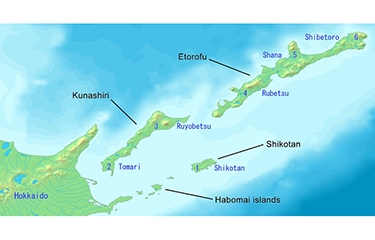Russia refuses to negotiate Japanese fishing access in southern Kuril Islands

After placing new sanctions on Russia, Japan now has to deal with its northern neighbor refusing to schedule annual negotiations for fishing access in territorial waters around the southern Kuril Islands.
Though the two countries recently completed a deal for fishing access for parts of each other’s exclusive economic zones (EEZs), Russia has ruled out any talks on access to waters around the disputed islands so long as Japan continues to take what it calls hostile measures.
The dispute over the southern Kuril Islands dates back decades. In the closing days of World War II, the Soviet Union occupied and annexed the southern Kuril Islands, which lie northeast of Hokkaido. Japan does not recognize this loss of territory and continues to claim what it calls the “Northern Islands.” Japan and the Soviet Union ended their formal state of war with the Soviet–Japanese Joint Declaration of 1956, but did not sign a peace treaty due to the conflicting claims.
Japan gained concessions on the issue by promising development aid. In 1998, the countries signed the “Agreement between the Government of Japan and the Government of the Russian Federation on some matters of cooperation in the field of fishing operations for marine living resources” under which Japan pays for fishing access to waters around the islands of Etorofu, Kunashiri, and Shikotan, and the Habomai group of islets.
Russia suspended this pact on 7 June, 2021, because Tokyo had stopped providing payments and technical support to the Sakhalin-2 oil and gas project. Japan argued the project and the fishing agreement were not directly linked, and said the text of the fishing agreement does not mention the project. But Russia views them as a package deal.
On 30 June, 2022, the Sakhalin-2 project was reorganized by Russia under a new company. Japanese investors Mitsubishi and Mitsui decided to participate in the new entity, and in late August 2022, the Russian government approved their participation. Japanese power companies also continue to buy power from the venture . The Japanese government has encouraged continued cooperation with Russia on energy, as it has a significant dependence on Russian oil and gas. In 2020, 51.6 percent of the Sakhalin-2 project’s liquefied natural gas (LNG) exports went to Japan, and Russia is the source for about 9 percent of Japan’s LNG.
Japan has since resumed its payments and cooperation, which would seem to resolve the issue, but the Russian side has not budged on setting a date for the fishery negotiations due to Japanese sanctions against Russia following its invasion of Ukraine.
The last formal negotiations between the two countries were held on 12 December, 2021, to set terms for the 2022 season. At that time, a total quota of 2,177 metric tons (MT) was approved. The agreement allowed access to the Russian controlled waters for 31 Japanese vessels in exchange for “cooperation funds” amounting to JPY 1.1 million (USD 8,576, EUR 7,837) and provision of JPY 31.1 million (USD 242,424, EUR 221,618) worth of equipment.
The agreed seasons and quotas by species were: Alaska pollock gillnetting from 1 January to 15 March, 955 MT; arabesque greenling from 16 September to year-end, 777 MT; octopus in January and again from 16 October to year-end, 213 MT; others 232 MT. If a similar agreement were in place for 2023, Japanese fishermen would already be fishing for pollock and octopus.
On 19 January, 2023, in response to continued urging from the Japanese Ministry of Foreign Affairs, Russia informed Japan that it was ...
Image courtesy of Wikimedia





Share